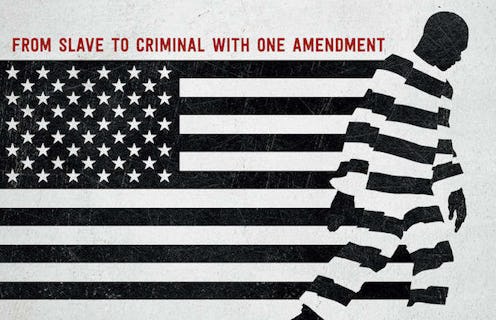Entertainment
'13th' Will Change The Way You Look At America

For most American citizens, we are taught from the early years in our educational lives that the American legal system is a fair and just organization that works in a code of fairness and honor. But if you watch director Ava DuVernay’s Netflix documentary, 13th, you'll likely be left with questions about just how much honor our “free” country was built on. The film, available to stream on Netflix now, received its name from the 13th Amendment of the U.S. Constitution, which states that all Americans are granted freedom, including slaves. This might seem impossible today to argue with — but the movie uncovers the clause that takes away that same right once a citizen has convicted a crime in America, and because of this, DuVernay's new doc is absolute must-see filmmaking.
“Everybody knows the 13th Amendment of the Constitution says there shall be no slavery in the United States,” explained DuVernay in an interview with Complex Magazine prior to the film's release. “Most people don’t know that that is a lie. Right after it says there shall be no slavery, there’s a little clause, a little loophole, that says ‘except.’ The exception is, except if we think you’re a criminal.”
That exception is shown in detail during the film, with the harsh and dark reality of policing in our society and prison abuse in the name of capitalism in our country displayed for all to see. 13th makes it clear that the new faces of slavery are those who are held in the American prison system. 25 percent of the world’s prisoners are held in the U.S. with an unbalanced number of them being black, according to WhiteHouse.gov. Indeed, as 13th highlights, our prison population has grown from 300,000 in 1972 to 2.3 million in 2016 — where black men represent 6.5 percent of the general population but 40.2 percent of the prison population. This is an unacceptable statistic, and one that 13th leaves you thinking about long after you finish your viewing.
America is often referred to as one of the greatest countries in the world due to the freedom of individualism, freedom of choice, and ability to progress without “barriers,” but with 13th, DuVernay debunks the mentality that America was built on equality when she chronicles the roaring underbelly of racial inequality through the prison system. It’s not surprising to see statistics that show the gaps of racial representation in the system when the image of the African American male has historically been seen as brute and malicious. DuVernay used the 1915 film Birth of a Nation to prove that point, arguing that the term “second-class citizen" was embodied and bolstered in the film, which pushed the perception of criminality that a black man (rather, a white actor in blackface) was an animal who could not be controlled against white Americans.
In 13th, DuVernay masterfully pieces together the narrative of the incarcerated African American demographic in the film by collecting interviews from a mix of academics, activists, politicians, in addition to showing clips from films and footage of U.S. history. She touches on the civil rights movement, the Civil Rights Act of 1964, the media's tendency to describe all minority-rich communities as crime-ridden, and both President Richard Nixon and Ronald Reagan’s declarations on the “war on drugs." DuVernay highlights the parallels between modern times, with current campaign images of Donald Trump’s rallies and dangerous, discriminatory rhetoric, to old footage of a black man being pushed, beat and chased down the street by white men. The imagery used in the movie is haunting, but so necessary, as it demands viewers pay attention to the race relation sores in America.
With the advancement of knowledge and information and movies like 13th, there is no longer an excuse as to why all Americans should not know the state of our country’s foundation in incarceration. The film will leave you heavy with a fire burning within, one that will spark an anger to change the system right now.
Images: Netflix